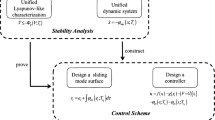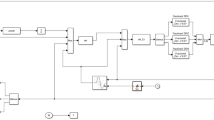Abstract
In this paper, a technique is presented to determine the stability margin of the discrete systems using recursive algorithm for power of companion matrix and Gerschgorin Theorem and hence sufficient condition of stability is obtained. The method is illustrated with an example and it is compared with other methods proposed in the literature. The results have applications in the filter design.
Similar content being viewed by others
References
D. R. Choudhury. Modern Control Engineering. India: Prentice Hall, 2005.
A. Tewari. Modern Control Design. New York: Wiley, 2003.
G. Benke, B. B. Wells. Estimates for the stability of low-pass filters. IEEE Transactions on Acoustics, Speech, and Signal Processing, 1985, 33(1): 98–105.
W. Lu. Design of recursive digital filters with prescribed stability margin: A parameterization approach. IEEE Transactions on Circuits and Systems-II: Analog and Digital Signal Processing, 1988, 45(9): 1289–1298.
J. O. Smith. Introduction to Digital Filters with Audio Applications. New York: Stanford Unversty, 2007.
H. C. Reddy, P. K. Ranjan, M. N. S. Swamy. A simple sufficient criterion for the stability of multidimensional filters. Proceedings of IEEE, 1982, 70: 301–303.
A. Ghafoor, R. N. Iqbal, S. A. Khan. Stability conditions for discrete domain characteristics polynomial. Proceedings of the 7th World Multiconference on Systems, Cybernetics and Informatics. 2003, 15: 98–101.
H. Hertz, E. Zeheb. On the stability and instability of n dimensional discrete systems. IEEE Transactions on Automatic Control, 1986, 31: 872–874.
S. Gerschgorin. Ueber die abgrenzung der eigenwerte einer matrix. Izv, Akad. Nauk. SSSR Ser. Mat., 1931, 1: 749–754.
F. G. Boese, W. J. Luther. A note on a classical bound for the moduli of all zeros of a polynomial. IEEE Transactions on Automatic Control, 1989, 34(9): 998–1001.
E. Zeheb. On the largest modulus of polynomial zeros. IEEE Transactions on Circuit and Systems, 1991, 38(3): 333–336.
M. S. Zilovic, L. M. Roytman, P. L. Combettes, et al. A bound for the zeros of polynomials. IEEE Transactions on Circuits and Systems — I: Fundamental Theory and Applications, 1992, 39(6): 476–478.
Y. J. Sun. Simple instability criterion for a class of uncertain discrete systems. IEEE Transactions on Circuits and Systems, 2006, 53(5): 409–411.
B. Dumitrescu, B. C. Chang. Robust schur stability with polynomial parameters. IEEE Transactions on Circuits and Systems, 2006, 53(7): 535–537.
D. R. Choudhury. Algorithum for power of companion matrix and its applications. IEEE Transactions on Automatic Control, 1973, 18(2): 179–180.
M. A. Hassan. Inequalities and Bounds for the zeros of polynomials using Perron-Frobenius and Gerschgorin Theories. Proceedings of American Control Conference, Boston, Massachusetts. Evanston, IL: American Automatic Control Council, 2004, 3: 2745–2750.
E. Kreyszig. Advanced Engineering Mathematics. 8th ed. New York: Wiley, 1999.
Author information
Authors and Affiliations
Corresponding author
Additional information
Yogesh V. HOTE received his B.E. degree in Electrical Engineering from Government College of Engineering, Amravati, in 1998. Then, he received his M.E. degree in Control Systems, from Government College of Engineering, Pune, in 2000. He also received his Ph.D. degree in Instrumentation and Control Engineering, University of Delhi in 2009. His field of research includes robust control, robotics, numerical analysis, and power electronics.
J. R. P. GUPTA received his B.S. (Engg.) degree in Electrical Engineering from Muzaffarpur Institute of Technology, Muzaffarpur, and Ph.D. from University of Bihar in 1972 and 1983, respectively. His research interests include power electronics, electrical drives, and control theory.
D. Roy CHOUDHURY received his B.Tech. and M.Tech degrees in Radio Physics and Electronics from the Institute of Radio Physics and Electronics, University of Calcutta, Calcutta in 1965 and 1966, respectively. He has been awarded the degree of Doctor of Philosophy from the same university in 1971. His field of research includes control systems, digital communications, and biomedical engineering.
Rights and permissions
About this article
Cite this article
Hote, Y.V., Gupta, J.R.P. & Choudhury, D.R. A simple approach for stability margin of discrete systems. J. Control Theory Appl. 9, 567–570 (2011). https://doi.org/10.1007/s11768-011-9141-3
Received:
Revised:
Published:
Issue Date:
DOI: https://doi.org/10.1007/s11768-011-9141-3




